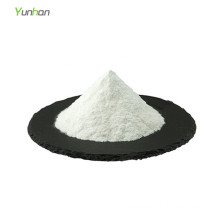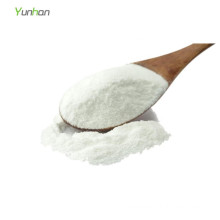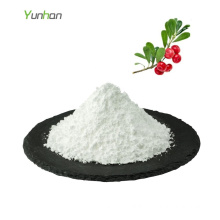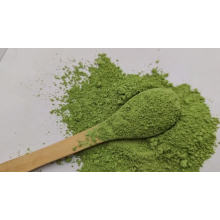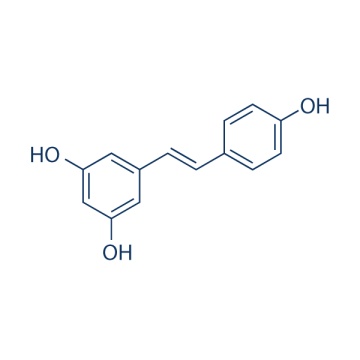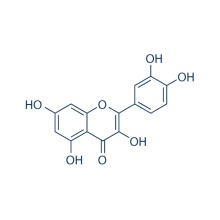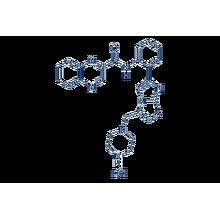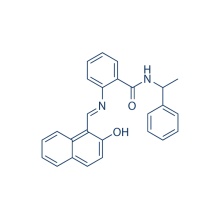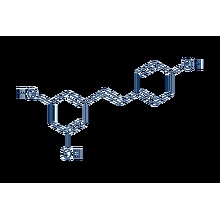Resveratrol 501-36-0
Product Description
.cp_wz table {border-top: 1px solid #ccc;border-left:1px solid #ccc; } .cp_wz table td{border-right: 1px solid #ccc; border-bottom: 1px solid #ccc; padding: 5px 0px 0px 5px;} .cp_wz table th {border-right: 1px solid #ccc;border-bottom: 1px solid #ccc; padding: 5px 0px 0px 5px;}
Molecular Weight:
228.24 Resveratrol is a phytoalexin produced naturally by several plants with anti-cancer, anti-inflammatory, blood-sugar-lowering and other beneficial cardiovascular effects.
Biological Activity
Resveratrol inhibits the activity of Cyclooxygenase and lipooxygenase, PKCs and p56lck,
ERK1, JNK1, p38, IKK β, Src, STAT3, Ribonucleotide Reductase, DNA
polymerases α and δ, PKD, PKC α, Quinone reductase 2, and Aromatase with
IC50 of from 0.035-60 μM. Resveratrol is also an activator of Adenylyl
cyclase and AMPK with EC50 of 0.8 μM and 50 μM, respectively.
The roles
of Resveratrol as inhibitor or activator enable its effects on
decreasing cell inflammatory associated behaviors, growth inhibition and
induction of Apoptosis in cancer cells, reversal of endothelin-1
stimulated cell responses, inhibition of phorbol ester-induced
expression of COX-2, inhibition of DNA synthesis in cell, resistance to
menadione-induced cell death, and improvement of cell mitochondrial
function and glucose/lipid Metabolism.
Resveratrol is
also an activator of sirtuins. Resveratrol lowers the Michaelis constant
of SIRT1 for both the acetylated substrate and NAD+, and
increases cell survival by stimulating SIRT1-dependent deacetylation of
p53. In yeast, Resveratrol mimics calorie restriction by stimulating
Sir2, increasing DNA stability and extending lifespan. Resveratrol is effective at protecting isolated rat hearts against
ischemia/reperfusion injury via its antioxidant activity, with improved
recovery of developed pressure and aortic flow, reduction of
malondialdehyde concentrations and reduction of infarct size.
Resveratrol improves health and survival of mice on a high-calorie diet.
Resveratrol (22.4 mg/kg/day) shifts the physiology of middle-aged mice
on a high-calorie diet towards that of mice on a standard diet and
significantly increases their survival. Resveratrol produces changes
associated with longer lifespan, including increased insulin
sensitivity, reduced insulin-like growth factor-1 (IGF-I) levels,
increased AMP-activated protein kinase (AMPK) and peroxisome
proliferator-activated receptor-γcoactivator 1α(PGC-1α) activity,
increased mitochondrial number, and improved motor function.
Resveratrol
opposed the effects of the high-calorie diet in 144 out of 153
significantly altered pathways. Resveratrol has been
shown to inhibit the initiation and growth of tumors in a wide variety
of rodent cancer models. Dose of Resveratrol as low as 200 μg/kg daily
already shows efficacy in a rat model of colon carcinogenesis. At higher
dose of 40 mg/kg, Resveratrol increases the survival of mice with
subcutaneous neuroblastomas from 0% to 70%.
Resveratrol inhibits
vascularization in the corneal micropocket assay in mice at a dose of
only 48 μg/kg when administered daily. Resveratrol shows
beneficial effects on heart disease. Resveratrol blocks the increase in
platelet aggregation induced by a hypercholesterolaemic diet.
Resveratrol increase expression of both endothelial and inducible nitric
oxide synthase. In stroke-prone, spontaneously hypertensive rats,
resveratrol significantly reduces markers of oxidative stress such as
glycated albumin in serum, and 8-hydroxyguanos-ine in urine.
Providing
Resveratrol in drinking water for 15 days (1 mg/kg) is sufficient to
improve the recovery in function and coronary flow of isolated hearts. Resveratrol displays anti-inflammatory activity in vivo. Resveratrol
significantly reduces both acute and chronic chemically induced oedema,
lipopolysaccharide-induced airway inflammation and osteoarthritis, and
helps to prevent allograft rejection.
Intravenously administered
Resveratrol decreases inflammation induced by ischaemia/reperfusion,
oxidants generated by hypoxanthine/xanthine oxidase (HX/XO) or
platelet-activating factor, but not leukotriene B4 in rats. Resveratrol shows beneficial effects on stroke and brain damage.
Resveratrol administered intravenously significantly decreased ischaemic
volume and brain water content at the extremely low doses of 100 ng/kg
and 1 μg/kg after middle cerebral artery occlusion in rats.
Contact us if you need more details on 501-36-0. We are ready to answer your questions on packaging, logistics, certification or any Other aspects about Resveratrol 501-36-0、501-36-0 Resveratrol. If these products fail to match your need, please contact us and we would like to provide relevant information.
Molecular Weight:
228.24 Resveratrol is a phytoalexin produced naturally by several plants with anti-cancer, anti-inflammatory, blood-sugar-lowering and other beneficial cardiovascular effects.
Biological Activity
Resveratrol inhibits the activity of Cyclooxygenase and lipooxygenase, PKCs and p56lck,
ERK1, JNK1, p38, IKK β, Src, STAT3, Ribonucleotide Reductase, DNA
polymerases α and δ, PKD, PKC α, Quinone reductase 2, and Aromatase with
IC50 of from 0.035-60 μM. Resveratrol is also an activator of Adenylyl
cyclase and AMPK with EC50 of 0.8 μM and 50 μM, respectively.
The roles
of Resveratrol as inhibitor or activator enable its effects on
decreasing cell inflammatory associated behaviors, growth inhibition and
induction of Apoptosis in cancer cells, reversal of endothelin-1
stimulated cell responses, inhibition of phorbol ester-induced
expression of COX-2, inhibition of DNA synthesis in cell, resistance to
menadione-induced cell death, and improvement of cell mitochondrial
function and glucose/lipid Metabolism.
Resveratrol is
also an activator of sirtuins. Resveratrol lowers the Michaelis constant
of SIRT1 for both the acetylated substrate and NAD+, and
increases cell survival by stimulating SIRT1-dependent deacetylation of
p53. In yeast, Resveratrol mimics calorie restriction by stimulating
Sir2, increasing DNA stability and extending lifespan. Resveratrol is effective at protecting isolated rat hearts against
ischemia/reperfusion injury via its antioxidant activity, with improved
recovery of developed pressure and aortic flow, reduction of
malondialdehyde concentrations and reduction of infarct size.
Resveratrol improves health and survival of mice on a high-calorie diet.
Resveratrol (22.4 mg/kg/day) shifts the physiology of middle-aged mice
on a high-calorie diet towards that of mice on a standard diet and
significantly increases their survival. Resveratrol produces changes
associated with longer lifespan, including increased insulin
sensitivity, reduced insulin-like growth factor-1 (IGF-I) levels,
increased AMP-activated protein kinase (AMPK) and peroxisome
proliferator-activated receptor-γcoactivator 1α(PGC-1α) activity,
increased mitochondrial number, and improved motor function.
Resveratrol
opposed the effects of the high-calorie diet in 144 out of 153
significantly altered pathways. Resveratrol has been
shown to inhibit the initiation and growth of tumors in a wide variety
of rodent cancer models. Dose of Resveratrol as low as 200 μg/kg daily
already shows efficacy in a rat model of colon carcinogenesis. At higher
dose of 40 mg/kg, Resveratrol increases the survival of mice with
subcutaneous neuroblastomas from 0% to 70%.
Resveratrol inhibits
vascularization in the corneal micropocket assay in mice at a dose of
only 48 μg/kg when administered daily. Resveratrol shows
beneficial effects on heart disease. Resveratrol blocks the increase in
platelet aggregation induced by a hypercholesterolaemic diet.
Resveratrol increase expression of both endothelial and inducible nitric
oxide synthase. In stroke-prone, spontaneously hypertensive rats,
resveratrol significantly reduces markers of oxidative stress such as
glycated albumin in serum, and 8-hydroxyguanos-ine in urine.
Providing
Resveratrol in drinking water for 15 days (1 mg/kg) is sufficient to
improve the recovery in function and coronary flow of isolated hearts. Resveratrol displays anti-inflammatory activity in vivo. Resveratrol
significantly reduces both acute and chronic chemically induced oedema,
lipopolysaccharide-induced airway inflammation and osteoarthritis, and
helps to prevent allograft rejection.
Intravenously administered
Resveratrol decreases inflammation induced by ischaemia/reperfusion,
oxidants generated by hypoxanthine/xanthine oxidase (HX/XO) or
platelet-activating factor, but not leukotriene B4 in rats. Resveratrol shows beneficial effects on stroke and brain damage.
Resveratrol administered intravenously significantly decreased ischaemic
volume and brain water content at the extremely low doses of 100 ng/kg
and 1 μg/kg after middle cerebral artery occlusion in rats.
Contact us if you need more details on 501-36-0. We are ready to answer your questions on packaging, logistics, certification or any Other aspects about Resveratrol 501-36-0、501-36-0 Resveratrol. If these products fail to match your need, please contact us and we would like to provide relevant information.
Product Categories : Epigenetics > Sirtuin Inhibitor
Other Products
Hot Products
Astragaloside AChlortetracycline HCl 64-72-2Paclitaxel 33069-62-4Dexamethasone Acetate 1177-87-3Dinaciclib (SCH727965) 779353-01-4CHIR-124 405168-58-3Ro3280 1062243-51-9TAME 901-47-3CCG-1423 285986-88-110058-F4 403811-55-2Dabigatran (BIBR 953) 211914-51-1H 89 2HCl 130964-39-5T0901317 293754-55-9Aprepitant 170729-80-3Turofexorate Isopropyl (XL335) 629664-81-9BMS-378806 357263-13-9

